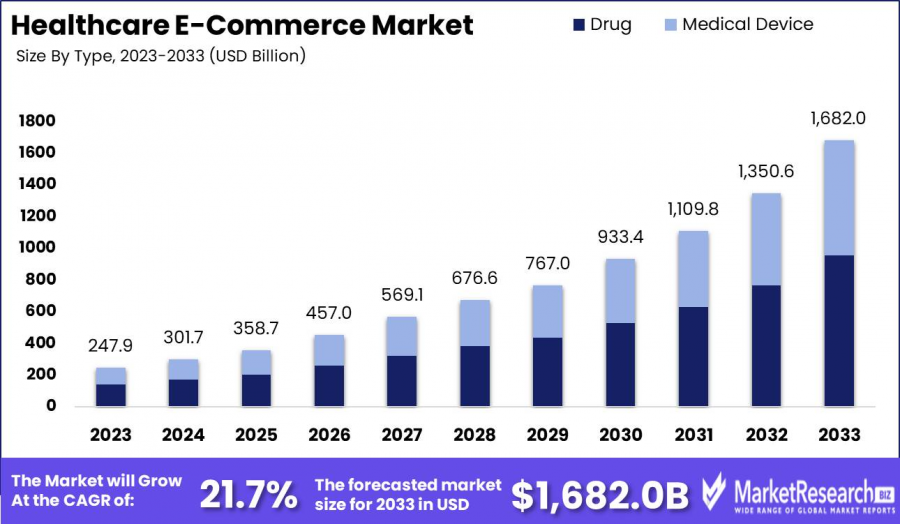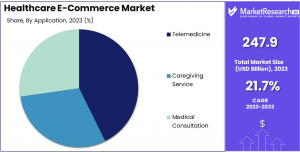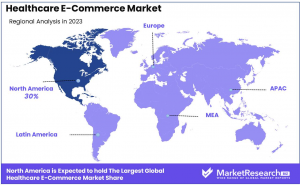
Healthcare E-Commerce Market Witnesses Unprecedented Expansion, Surpassing USD 1682.0 Billion
The Global Healthcare E-Commerce Market was valued at USD 247.9 Bn in 2023. It is expected to reach USD 1682.0 Bn by 2033, with a CAGR of 21.7%
NEW YORK, NY, UNITED STATES, February 11, 2025 /EINPresswire.com/ -- Overview
The Global Healthcare E-Commerce Market was valued at USD 247.9 Bn in 2023. It is expected to reach USD 1682.0 Bn by 2033, with a CAGR of 21.7% during the forecast period from 2024 to 2033.
Healthcare e-commerce is revolutionizing how consumers and healthcare providers access medical supplies, prescription medications, and telehealth services. The rapid adoption of digital platforms has enhanced convenience, enabling patients to order essential healthcare products from the comfort of their homes. With growing demand for online pharmacies, telemedicine consultations, and direct-to-consumer healthcare solutions, the sector is experiencing significant expansion.
The integration of artificial intelligence (AI) and data analytics is further improving personalized healthcare recommendations, ensuring timely deliveries, and optimizing supply chain management. Major players in the healthcare e-commerce industry are leveraging automation and digital payment solutions to enhance customer experience and operational efficiency.
Government regulations and compliance frameworks are evolving to support the safe and secure distribution of pharmaceuticals and medical devices through online channels. The increasing awareness of digital healthcare solutions, coupled with the expansion of mobile health applications, is fueling industry growth.
With the global healthcare e-commerce market projected to expand in the coming years, the shift towards digital platforms is expected to improve accessibility, affordability, and efficiency in healthcare services. As more consumers embrace online healthcare solutions, companies continue to innovate, shaping the future of digital health commerce.
Click here to get a Sample report copy@ https://marketresearch.biz/report/healthcare-e-commerce-market/request-sample/
Key Takeaways
•Market Growth: The healthcare e-commerce market is expanding rapidly, driven by increasing digital adoption, rising demand for online pharmacies, and growing telehealth services.
•Online Pharmacies Leading: Online pharmacies dominate the sector, offering prescription and over-the-counter medications, medical supplies, and wellness products, ensuring convenience and accessibility.
•AI and Automation Integration: AI-driven recommendations, automated order processing, and digital payment solutions enhance the efficiency and personalization of online healthcare services.
•Regulatory Developments: Governments are implementing strict regulations to ensure the safe distribution of pharmaceuticals and medical devices through online platforms.
•Rising Consumer Adoption: The increasing preference for online healthcare purchases, driven by ease of access and cost-effectiveness, continues to shape market expansion.
•Supply Chain Optimization: E-commerce platforms use data analytics and AI to streamline logistics, ensuring timely delivery of medical products.
•Growth in Mobile Health Apps: Mobile health applications are playing a crucial role in connecting consumers with e-commerce platforms, expanding the reach of digital healthcare services.
•Future Outlook: With continued technological advancements and regulatory support, the healthcare e-commerce market is expected to witness sustained growth, improving accessibility and affordability of healthcare solutions.
Segmentation Analysis
By Type Analysis
•Drugs Dominate the Healthcare E-Commerce Market with a 54% Share
In 2023, the Drugs segment led the Healthcare E-Commerce Market, holding over 54% of the market share. The growing preference for online pharmacies, offering both prescription and over-the-counter medications, significantly boosted this segment. Consumers increasingly rely on digital health platforms for convenient and cost-effective access to pharmaceuticals. The rise in chronic disease management and self-medication trends has further strengthened the demand for drug purchases through e-commerce channels, making it the largest contributor to market growth.
•Medical Devices Hold Over 40% Market Share, Driven by Telemedicine and Home Care
The Medical Devices segment accounted for more than 40% of the market, reflecting strong demand for online sales of diagnostic tools, monitoring devices, and home healthcare equipment. The surge in telemedicine adoption and aging populations worldwide have accelerated the need for remote health monitoring solutions. With consumers prioritizing home-based healthcare, the accessibility of medical devices through e-commerce platforms continues to expand, making it a crucial segment in the market.
By Application Analysis
•Telemedicine Leads with 47% Market Share in Healthcare E-Commerce
In 2023, Telemedicine dominated the Healthcare E-Commerce Market’s application segment, capturing more than 47% of the market share. Digital health platforms and mobile applications have enabled seamless virtual consultations, diagnoses, and treatments, reducing the burden on traditional healthcare systems. The increasing adoption of video conferencing and AI-driven healthcare solutions has fueled telemedicine’s rapid expansion, making it the most preferred application within the sector.
•Caregiving Services Account for Over 35% of the Market, Supporting Home-Based Care
The Caregiving Services segment held a 35%+ share, reflecting the growing demand for home-based care solutions. With an aging global population and an increasing number of patients requiring long-term assistance, digital platforms now offer easy access to professional caregivers. The shift towards remote caregiving solutions has strengthened this segment, improving patient care and convenience while reducing dependency on in-hospital treatment.
•Medical Consultation Holds Over 17% Share, Expanding Remote Healthcare Access
Medical Consultation remained a vital segment in the Healthcare E-Commerce Market, accounting for 17%+ of the market share. Online consultation platforms have gained traction by offering virtual access to healthcare specialists across various fields. Reduced wait times, improved accessibility, and cost-effective second opinions have made e-consultations an essential service in digital healthcare, driving consistent market growth in this category.
Market Segments
By Type
•Drug
•Medical Device
By Application
•Telemedicine
•Caregiving Service
•Medical Consultation
To Purchase this Premium Report @ https://marketresearch.biz/purchase-report/?report_id=47901
Market Dynamics
••Driver: Digital Transformation in Healthcare
The healthcare sector is undergoing a significant digital transformation, integrating advanced technologies to enhance service delivery. This shift includes the adoption of electronic health records, telemedicine, and mobile health applications, making healthcare services more accessible and efficient. The COVID-19 pandemic has further accelerated this trend, highlighting the need for remote healthcare solutions and boosting the adoption of e-commerce in healthcare.
••Trend: Growth of Telemedicine and Online Pharmacies
There is a notable increase in the use of telemedicine and online pharmacies, driven by the demand for convenient and accessible healthcare services. Patients are increasingly opting for virtual consultations and online medication purchases, reducing the need for physical visits to healthcare facilities. This trend is supported by advancements in digital platforms and changing consumer preferences towards online healthcare solutions.
••Restraint: Data Privacy and Security Concerns
The expansion of healthcare e-commerce raises significant concerns regarding data privacy and security. Handling sensitive patient information requires stringent measures to prevent data breaches and unauthorized access. Compliance with regulations such as the Health Insurance Portability and Accountability Act (HIPAA) in the U.S. and the General Data Protection Regulation (GDPR) in Europe imposes challenges for healthcare providers and e-commerce platforms in managing and protecting patient data.
••Opportunity: Expansion of Personalized Healthcare Services
The integration of e-commerce in healthcare presents opportunities for personalized healthcare services. By leveraging data analytics and digital tools, healthcare providers can offer tailored health and wellness products, customized treatment plans, and targeted health interventions. This personalized approach enhances patient engagement and satisfaction, leading to better health outcomes and opening new avenues for service providers in the healthcare e-commerce market.
Market Key Players
•Amazon
•Walmart Inc.
•Acelity L.P. Inc.
•Flipkart Pvt. Ltd.
•McCabes Pharmacy
•Alibaba Group Holding Ltd.
•GE Healthcare
•Lloyds Pharmacy Ltd.
•Owens & Minor Inc.
•Siemens Healthcare
•CVS Health.
•Remdi SeniorCare
•Cerner Corporation
•EBOS Group Ltd.
•eBay Inc.
•Exactcare Pharmacy
Regional Analysis
•North America Leads with 30% Market Share
North America remains the dominant region in the healthcare e-commerce market, holding a 30% share. The region's leadership is attributed to its advanced healthcare infrastructure, widespread internet adoption, and high consumer awareness of online healthcare services. Strong regulatory frameworks ensure secure transactions, while efficient logistics networks enhance the accessibility of medical products. The presence of major e-commerce and pharmaceutical companies further supports the market’s expansion, making North America a key driver of digital healthcare transformation.
•Europe Expands with Growing Digital Health Investments
Europe is a significant player in the healthcare e-commerce market, driven by increasing investments in digital health solutions and a rising preference for online pharmacies. Countries such as Germany, the UK, and France are at the forefront, benefiting from well-established healthcare systems and supportive government policies. High internet penetration and strong consumer trust in digital healthcare services further accelerate market adoption. However, regulatory complexities in pharmaceutical e-commerce present occasional challenges to market expansion.
•Asia Pacific Experiences Fastest Market Growth
Asia Pacific is the fastest-growing region in the healthcare e-commerce market, driven by rapid urbanization, increasing smartphone and internet penetration, and rising healthcare expenditures. China and India are leading contributors, supported by large populations and government initiatives promoting digital health. The growing adoption of mobile health applications, expanding online pharmacy networks, and increasing consumer reliance on e-commerce platforms for healthcare needs are fueling the region’s strong market growth.
•Middle East & Africa Shows Emerging Potential
The Middle East & Africa region is gradually expanding in healthcare e-commerce, supported by growing internet penetration and an emerging middle class with increasing access to digital services. The UAE and South Africa are emerging as key markets, leveraging government initiatives to improve digital healthcare infrastructure. While the market share remains smaller compared to other regions, rising investments in online healthcare platforms and growing consumer awareness are expected to drive future growth.
•Latin America Sees Steady Growth with Brazil and Mexico Leading
Latin America is gradually embracing healthcare e-commerce, with Brazil and Mexico at the forefront. Market growth is fueled by an expanding middle class, improved internet accessibility, and rising healthcare demands. Online pharmacies and telemedicine services are gaining traction as consumers seek convenient healthcare solutions. While infrastructure challenges persist, increasing investments in digital health technologies and e-commerce platforms are expected to support the region’s long-term market expansion.
Emerging Trends in Healthcare E-Commerce:
•Expansion of Telemedicine Services: Telemedicine has become a key component of healthcare e-commerce. Patients now have the option to consult with healthcare providers remotely, reducing the need for in-person visits. This approach enhances access to care, especially for individuals in remote areas. The convenience and efficiency of telemedicine are driving its widespread adoption.
•Growth of Online Pharmacies: Online pharmacies are gaining popularity, offering patients the ability to order medications and have them delivered to their homes. This service is particularly beneficial for those with mobility issues or busy schedules. The ease of online ordering and home delivery is contributing to the growth of e-commerce in the pharmaceutical sector.
•Adoption of Wearable Health Devices: Wearable health devices, such as fitness trackers and smartwatches, are increasingly being used to monitor health metrics. These devices collect data that can be shared with healthcare providers through e-commerce platforms, facilitating remote monitoring and personalized care. The integration of wearable technology into healthcare e-commerce is enhancing patient engagement and health management.
Use Cases of Healthcare E-Commerce:
•Remote Patient Monitoring: Healthcare e-commerce platforms enable remote monitoring of patients with chronic conditions. For instance, patients can use devices to track their blood pressure or glucose levels and share this data with their healthcare providers online. This continuous monitoring allows for timely interventions and better disease management.
•Virtual Mental Health Services: E-commerce in healthcare has expanded to include virtual mental health services. Patients can access counseling and therapy sessions online, providing greater flexibility and privacy. This approach has been effective in reaching individuals who may not seek traditional in-person therapy, thereby improving mental health support.
•Personalized Health Recommendations: E-commerce platforms are utilizing data analytics to offer personalized health recommendations. By analyzing user data, these platforms can suggest tailored wellness products, exercise plans, or dietary advice. This personalization enhances user engagement and promotes healthier lifestyles.
Lawrence John
Prudour
+91 91308 55334
email us here
Distribution channels: Healthcare & Pharmaceuticals Industry
Legal Disclaimer:
EIN Presswire provides this news content "as is" without warranty of any kind. We do not accept any responsibility or liability for the accuracy, content, images, videos, licenses, completeness, legality, or reliability of the information contained in this article. If you have any complaints or copyright issues related to this article, kindly contact the author above.
Submit your press release


